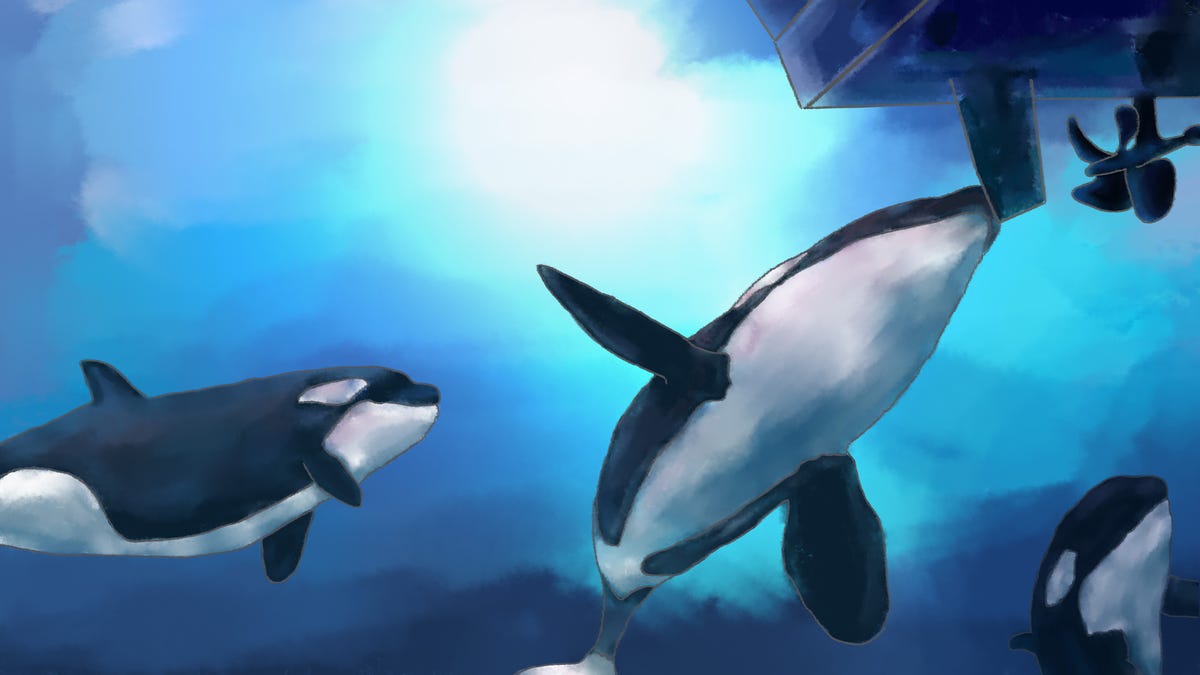For the last five-plus years, killer whales have been ramming – and in some cases sinking – expensive yachts, sailboats and fishing boats in the crystalline waters off the coasts of Spain, Portugal, France and Morocco.
On Sept. 13, two more incidents were reported off Portugal. According to the National Maritime Authority of Portugal, one involved a sailboat off Fonte da Telha beach. The five people onboard were unharmed and the sunken sailboat was taken to the harbor of Oeiras, the report said. Social media reports claim to have captured the incident.
In a second encounter, four people were aboard a tourist vessel off Cascais Bay when the orcas interacted with the vessel.
🇵🇹 Orca attacks sailing boat, causing it to sink off Portugal’s coast. Orcas ‘broke the rudder of the sailboat, opening a hole below the waterline, allowing water to enter.’ Sailors did not require medical assistance. pic.twitter.com/vovijsYk3j
— Engaging Topics (@EngagingTopics) September 16, 2025Why do orcas ‘attack’ boats?
Scientist say the incidents are not aggressive and should not be referred to as attacks but as encounters with playful, rambunctious animals. The pod of orcas in the sailboat incident interacted with the rudder, which caused it to break, allowing water into the vessel; this has been a common factor in recent sinkings.
This orca pod interacts with the vessels because they are being enriched by the experience, said Renaud de Stephanis, president of CIRCE (Conservación, Información y Estudio sobre Cetáceos), last year. De Stephanis has been studying orca behavior for more than 25 years.
“The sea is a very boring place for an animal,” de Stephanis said. “Imagine if you’re a dog or some other mammal; you can interact with objects around you. But in the sea, there’s not much for the orcas to interact with, so they play with the rudders.”
Types of rudders Iberian orcas have approached:
How often do orcas interact with boats?
Such encounters have been going on for more than five years; the first documented encounter was in May 2020. Since then, at least six sailboats and two Moroccan fishing boats have been sunk.
“It starts in the spring, goes way off the charts in the summer and goes away in fall. That’s because the whales and boats are in the same area at the same time,” said Naomi Rose, a senior scientist with the Animal Welfare Institute in Washington, DC.
Scientists meet to discuss why orcas interact with boats
A multinational group of orca experts sponsored by the governments of Spain and Portugal met in February 2024 and released a report outlining why they think the interactions are happening and what can be done to stop it.
What originally appeared to be attacks on more than 673 boats since 2020 now seem more likely to be a bunch of bored teenage orcas looking for something to do, cetacean expert Alexandre Zerbini said last year. Essentially, the whales started a fad of playing with boat rudders.
A dangerous game for young, bored whales
Overall the incidents have mostly involved juveniles, who are “more playful and courageous in approaching boats,” said Zerbini, who also chairs the International Whaling Commission’s scientific committee.
He imagines a young orca butted its head against a boat’s rudder one time, and when it moved, the orca thought, “This is fun.” After ramming it a few times, a piece of the rudder broke off, and that was even more fun because there was something to play with.
“There’s documented evidence of the orcas then playing with the pieces,” he said.
The behavior isn’t surprising, given that orcas have culture, exhibit coordinated behavior, share knowledge and have long memories, Rose said.
More about the Iberian orcas
Orcas, also called killer whales, are actually the largest member of the dolphin family. Dolphins in turn are a type of toothed whale, a group that includes porpoises, beaked whales and sperm whales.
In the face of incorrect information about the motivations behind the encounters, nearly 80 marine biologists published an open letter last September saying they didn’t believe aggression was behind the incidents.
“Science cannot yet explain why the Iberian orcas are doing this, although we repeat that it is more likely related to play/socializing than aggression,” they wrote. “However, it is unfounded and potentially harmful to the animals to claim it is for revenge for past wrongs or to promote some other melodramatic storyline.”
Contributing: Elizabeth Weise

